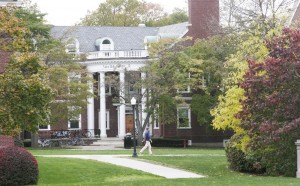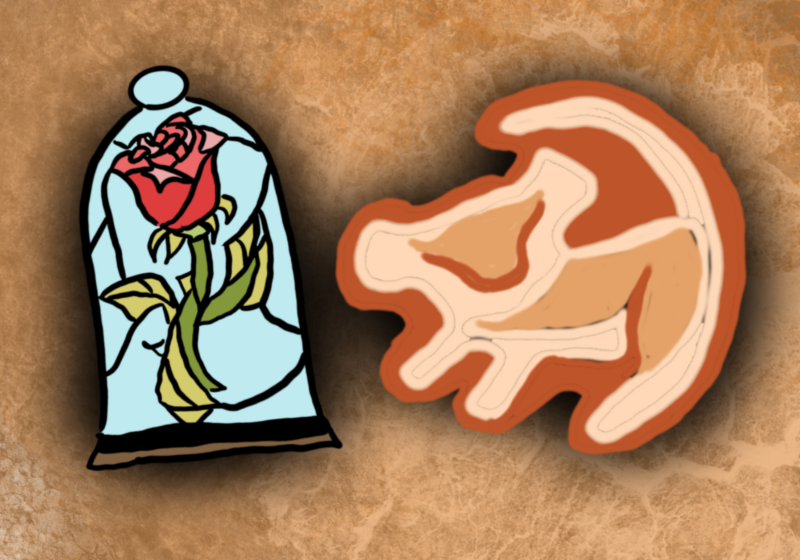
Drue Sokol, Photo Editor
Per the recommendations of a Fraternity Quad Task Force (FQTF), the University will spend $4 million on extensive renovations to the six Fraternity Quad houses this summer, and will accordingly incorporate them into UR’s Residential Life (ResLife) system.
The historic houses — Delta Kappa Epsilon, Sigma Alpha Mu, Sigma Chi, Psi Upsilon, Alpha Delta Phi and Theta Chi — were built in the 1930s and have been owned by UR for several decades. However, each fraternity has had the financial responsibility of house maintenance, which resulted in deferments of maintenance over the years.
Dean of the College Richard Feldman stressed that the change will not affect the relationship of fraternities with Fraternity & Sorority Affairs (FSA), nor how the fraternities operate, stating that the focus is on the management of the buildings.
While the University appropriately stepped in and assisted with maintenance that involved health and safety issues, less essential upkeep work accumulated over the years.
“It was getting worse and worse,” Feldman said. “The maintenance will be adequate all along now. The houses won’t fall into the condition they are in now.”
Work such as drainage, windows, heating systems, painting, cleaning, porch stability, accessibility issues and more will be addressed this summer, with the hope of bringing the buildings up to ResLife standards, Feldman said.
Despite what some have perceived as the implication that the University is tightening its control over the Frat Quad, as disciplinary issues on the Quad are “true and troubling,” they are a separate issue from the University’s decision to assume maintenance responsibility, Feldman said.
“My view is that this is saving the Frat Quad,” he said. “The system was deteriorating and [the fraternities] did not have the resources.”
The decision to fund the maintenance was made following the recommendations of the FQTF consisting of “influential people in the University system” who were either currently or formerly involved in fraternity and sorority life at UR. They were charged with rectifying the “downward spiral,” Feldman said.
Chairman of the Interfraternity Council (IFC), Chaplain of Sigma Phi Epsilon and senior Matthew Skurnick said that he thinks the University’s decision demonstrates that they “definitely want to improve Greek life on campus” and that he does not think it will make any aspect of fraternity and sorority life different other than “making life easier.”
Skurnick believes the fraternities could have raised the money needed for the renovations themselves, but that it would have taken far more time and organization.
“The University is fronting $4 million for Greek life — that presents huge opportunities,” Skurnick said. “I hope that the negative issues will not be negative once they are ironed out.”
But this comes with a burden as well.
“There’s a responsibility that the frats will have too — we can’t trash our houses now, we’re going to have to step up our game too,” he said.
Secretary of Sigma Alpha Mu (SAM) and junior Justin Calfo, who served on the FQTF, was less certain that the fraternities could have raised the money, but expressed his trust in the administration’s decision that the renovations are necessary.
“I don’t think that the Greek alumni were going to be able to raise the money needed to do these renovations,” he said. “It’s difficult for alumni to support an organization that they think might be changing.”
With some fraternities losing their houses on the Quad because of sanctions or other reasons, it becomes difficult to garner the necessary support from alumni, as houses are “deeply rooted in the experience” of Greek life, Calfo said. He added that alumni on the FQTF were overwhelmingly surprised and grateful for the University’s decision to fund the maintenance.
Details of how the fraternities’ inclusion into the ResLife system will function next fall are still being ironed out, particularly with regards to meal plans and summer move out.
According to Director of Dining Services Cam Schauf, Dining was asked to look at a variety of options and put together several different packages, ranging from keeping an Aramark chef in the houses, to bringing catered meals cooked elsewhere into the houses, to closing the kitchens and putting the fraternities on residential meal plans.
Schauf said that the packages were compiled based on “menu assumptions” and the idea that the most important meal for fraternities is dinner. Dining plans to solicit the input of fraternities over the coming months before making a decision.
“Our goal is to allow fraternities to keep the uniqueness of their meal plans, especially at dinner time,” Schauf said, adding that a transition to a completely residential meal plan is unlikely.
The meal plan packages will also determine the renovations to the houses’ kitchens, Schauf said. If fraternities decide on one of the packages involving catered meals, this much smaller cost for kitchen improvements would be absorbed in the larger renovation plan, Shauf said, while other options might require that the fraternity take on some of the costs of the renovations.
SAM was incorporated into campus dining for the first time this year and currently has an Aramark chef. Calfo said that while the SAM house culture has always been appreciative of chefs, they have experienced a “loss of autonomy of the kitchen.”
“We used to have better food,” he said. “The quality has gone down. It’s the same as everyone else’s now.”
SAM made the decision to use campus dining not necessarily because they were forced to, but because they “saw it as an inevitability” and thought “that the sooner we started, the better it would be,” Calfo said.
For the first time, ResLife came into rooms in the SAM house and others on the Quad this summer and conducted a summer move-out process similar to what is done in other residential dorms at UR. Calfo said things including TVs, cable boxes and furniture were taken, although they are unsure if this was the result of theft or ResLife.
“We want to be able to preserve the heritage of these rooms, the character,” Calfo said of fraterntity concern about this issue. He said that there was a “gray area” in what ResLife would be able to remove and stated that he did not think the situation “was handled as well as it could have been.”
Director of Residential Life Laurel Contomanolis said that FSA indicated to all groups last spring that the move-out would require brothers to empty rooms of personal belongings as a “transitional step in anticipation of the move to ResLife management” and adequately communicated the information.
“The groups were notified that trash and broken furniture would be removed from the houses and the houses would undergo summer cleaning in preparation for the academic year,” she said. “Observations by our staff indicated that SAM was left trashed, with little or no effort made to comply with the [FSA] request.”
Move-out this fall will function in much the same way, but provisions will be made to store some fraternity-owned items in the house, Contomanolis said.
Despite wide-ranging opinions on campus, fraternity brothers seem to agree about the fact that changes in the Frat Quad’s social climate are separate from the administration’s decision about maintenance.
Skurnick said that the social scene of the Frat Quad is indeed changing, but that this change is not directly related to the changes made by the administration. Much of the social scene has shifted off campus, to the 19th Ward for example, which he said is troubling because of the fact that MERT and UR Security cannot respond there; still, he thinks the social environment will move back on campus in the future. He referenced the fact that Sigma Chi has thrown “numerous” parties this fall and has had no issues, which he said “bodes well” for the future.
Senior Bennett Skupp, who has lived in the Theta Chi house for three years and was also involved with the FQTF, agreed that the noticeable changes to the social scene of the Frat Quad over the last four years are progressing tangentially to the administrative decision.
“I think it’s hard for students to separate the running of the house and the social scene,” he said. “They are changing together, but they are not related.”
Skupp said he thinks the Quad’s social atmosphere has changed because of “certain behaviors,” which he said previously occurred on the Frat Quad with less intervention from the administration. Skupp said he has observed a “huge shift off campus” in the social scene this semester. Although the two are not related, Skupp said he thinks that the changes in social life have made students see the administration’s decision as more grave than it is.
“If the social life was the same and this change was made, it wouldn’t be that big of a deal,” he said, stressing the fact that the Frat Quad is and always has been in constant flux.
Skupp also said that he thinks it’s still largely unclear how the administration will implement its decision and if they will come down on the side of maintenance or control. But given the University’s efforts to expand the school and the fact that the houses really are not very economical in terms of housing capacity, the decision should be viewed in an even more positive light, Skupp believes, as they easily could have discussed demolishing the houses entirely.
“It’s definitely a gesture that UR wants to keep frats on the Quad,” he said.
Calfo agreed with this assessment of change to UR’s social climate, referencing the instatement of a graduate student adviser now living in all of the Frat Quad houses as of this fall, which he says catalyzed the shifting of the social scene to off campus venues; the advisers provide greater security but students are anxious about the increased risk of policy violations, Calfo believes.
Director of FSA Monica Miranda Smalls applauded the administration’s decision. “I think there will be more focus on their values and the programming that the fraternities do, rather than on the facility,” she said. “The physical structure is not integral to who [the fraternities] are as an organization.”
Buletti is a member of the class of 2013.






